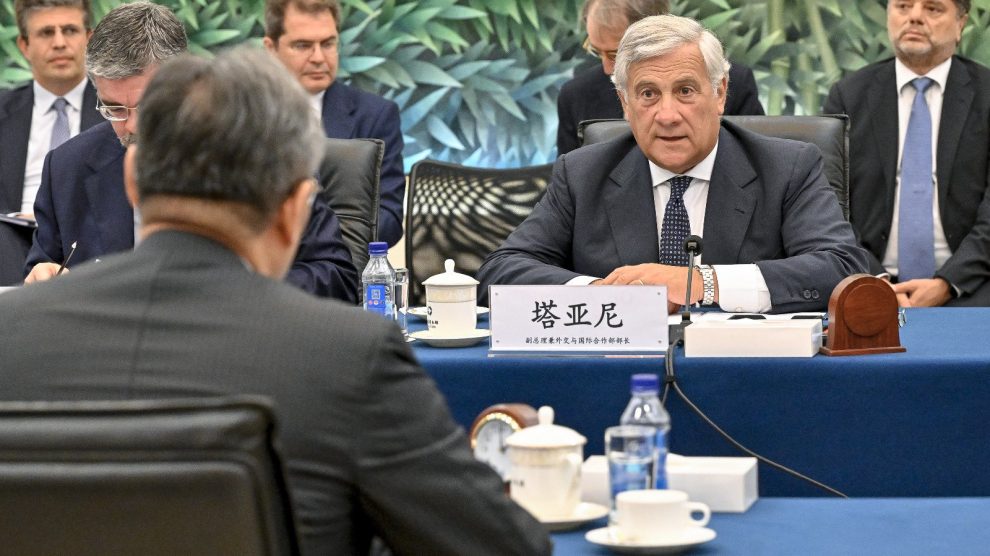Goodbye, BRI. Welcome back, strategic partnership. As part of his much-anticipated mission to Beijing, Italian Foreign Minister Antonio Tajani met with his Chinese counterpart and head of the Chinese Communist Party’s foreign policy division, Wang Yi, on Monday. The two co-presided a session of the Italy-China Governmental Committee, after which they gave a speech – with FM Tajani announcing the “opening of a new season” for “reinforced cooperation.”
- The key takeaway, as expected, is that Rome will exit the Belt and Road Initiative framework. That’s why the two officials touted the “global strategic partnership” between Rome and Beijing, launched by then-PMs Silvio Berlusconi and Wen Jiabao, as the main avenue for bilateral relations.
- “The strategic partnership is much more important than the Silk Road,” noted the Italian FM.
Upcoming trips, ongoing trust. FM Wang remarked that the contacts between Chinese President Xi Jinping and Italy’s heads of government and State – Prime Minister Giorgia Meloni and President Sergio Mattarella – “set the direction of relations and consolidated mutual trust.” Both are expected to visit Beijing in the coming months, with PM Meloni travelling in autumn and President Mattarella in early 2024.
- The latter’s visit, remarked FM Tajani, will “seal this friendship and concrete collaboration on the themes that have emerged during this work.”
- That’s a sign that the upcoming BRI exit will seriously damage Italy-China ties, not least because it’s in the interest of both parties to avoid tensions (and embarrassments – the BRI’s tenth anniversary is coming up) and preserve a functioning relationship.
Shift to the softer line. The emphasis on trust is crucial, given that in recent weeks, Chinese diplomacy had warned Italy that a failure to renew the BRI’s Memorandum of Understanding could have caused that very trust to deteriorate. But it seems that Beijing has changed its tone: even before the FMs meeting, the CCP’s English-language propaganda outlet Global Times had written that Rome’s “possible withdrawal” was “not [a] fundamental setback for China-Italy ties.”
- This runs counter to the claims of those in Italy who touted the BRI as a key way for Italy to correct its trade deficit with China and keep up with its European competitors – such as Giuseppe Conte, who in 2019 signed the MoU in his capacity as PM.
- Data from the Italian MFA refutes this thesis, showing that the BRI membership did not benefit Italy-China trade in any significant way. That’s the core argument employed by the Italian government – and recently reiterated by both PM Meloni and FM Tajani – to justify the exit and de-politicise the issue to avoid backlash from Beijing.
Carrots and sticks. Still, the Tajani-Wang meeting was far from an all-out lovefest. In the speech that followed, the Chinese FM called for the Italy-China Governmental Committee to become a “big family” and a conduit of “friendly exchanges” and “cooperation [that’s] beneficial to all family members” but also levelled thinly veiled criticism towards the United States, Italy’s main ally, and the wider Western drive to de-risk from China by evoking the impacts of “unilateralism, protectionism and anti-globalisation.”
- He made tongue-in-cheek references to Italian industry titans Fincantieri and Leonardo, pointing out that “the first Chinese-made large cruise ship, launched jointly by China and Italy, has successfully set sail” and noting “the participation of Italian companies in the CR929 large aircraft project” – the result of the consortium between China’s COMAC and the Russian United Aircraft Corporation to challenge the Airbus-Boeing duopoly.
- He called for a “fair, transparent, open and non-discriminatory business environment for Chinese companies in Italy” to “share the experience and dividends of development,” leaving aside the well-known restrictions on foreign companies operating in China and indirectly criticising the recent increase in Rome’s use of its “Golden Power” (the latest and most high-profile case concerns leading tyre maker Pirelli).
- “I don’t think China has ever been discriminated against,” replied FM Tajani during the presser. “I think [China has] nothing to complain about; we are respectful of those who want to make investments in our country.”
- Finally, FM Wang stated that China “is willing to continue to promote e-commerce platforms, strengthen internal coordination, and expand imports of quality Italian products” and that the two sides should also “jointly support large projects such as the STMicroelectronics joint venture” and the cruise ship to “create further landmarks.”
Some things never change. The Global Times piece cites Cui Hongjian, director of the Department of European Studies at the China Institute of International Studies, repeating what has become one of Beijing’s favourite talking points: picturing Rome as doggedly following Washington-stoked anti-China sentiment. “To some extent, the Meloni administration now wants to use its so-called withdrawal from the BRI pact as evidence that it has returned to mainstream Western politics. Clearly, there’s significant political influence and pressure from the US and other Western countries.”
Anticipating criticism. Still, Italian officials saw Beijing’s jabs coming from a mile away. On Sunday, FM Tajani remarked that Europe “must do more to count within NATO” and increase its “presence on international stages” so as to not “force the United States to be alone” – a show of support that extends to Washington’s strategic confrontation with Beijing.
- On Monday, in an interview with La Stampa, Defence Minister Guido Crosetto said that he “welcomes” and “fully subscribe[s]” to his colleague’s “more assertive” line on China. He then called FM Tajani and his Ministry the “directors and guardians” of Italy’s foreign policy.
- “We have never felt that we are trailing the US. Instead, we are convinced allies,” added Minister Crosetto, noting that through his increased assertiveness, Minister Tajani is “certifying a line that we are already following” – as opposed to Rome being “used to ask permission from all allies to do anything” in the past.




